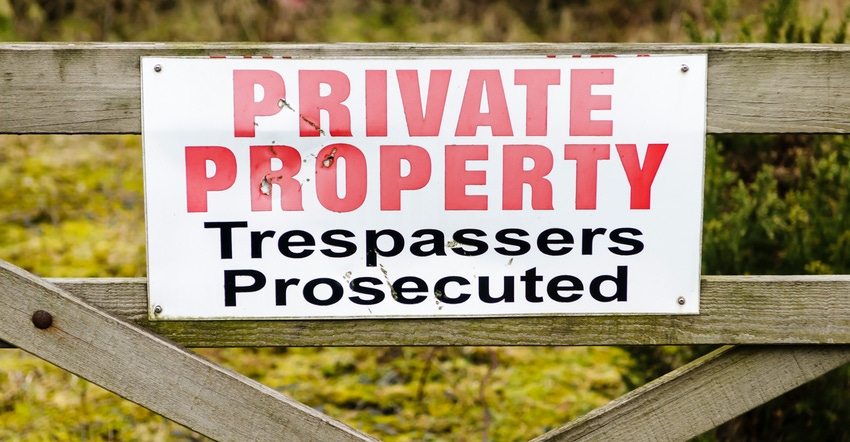
If you own farmland, at some point you have probably had to deal with trespassers. While trespassers are always an annoyance, how the law deals with trespassers varies, depending on the circumstances. Ohio law provides significant protection for landowners against trespassers. Under Ohio law, there are two types of trespassing – civil and criminal.
Civil trespassing
Civil trespassing is more concerned about compensating the landowner for any damages caused by the trespasser and less concerned with punishing the trespasser. While the mere presence of a trespasser on your property is technically civil trespassing, if the trespasser causes no harm, there is really no basis to file a lawsuit.
For example, Joe is walking on his friend’s property and strays over onto your land. You find him on your land, but he has done no damage. Of course, you can tell him to leave, but this is basically a “no harm, no foul” type of situation. Let’s expand the scenario and say Joe strayed onto your property and cut a tree down, still believing he was on his friend’s land. In this situation, Joe committed civil trespass and would be liable to you for the value of the tree. Civil trespass requires someone being on your land without permission and causing damage to you or your property.
Criminal trespassing
Criminal trespassing is different, in that intent is required. Most criminal violations require “mens rea,” which means “intention to do wrong” in Latin. To commit criminal trespass, the trespasser must intend to trespass. Using the above examples, Joe would not be guilty of criminal trespass if he genuinely did not know he was on your property – he did not have the requisite mens rea. However, if he walked past a no trespassing sign, or he otherwise knew where the property line was but crossed onto your property anyway, he intended to do the wrong, and thus would be committing criminal trespass. The penalty for criminal trespass is a fourth-degree misdemeanor.
What if, while Joe is trespassing on your property, he steps in a groundhog hole and breaks his leg. Are you liable? Many landowners probably assume they would be liable, but Ohio law provides good protection against trespasser injuries. Ohio law does not hold the landowner liable for injuries to trespassers as long as the landowner did not intentionally hurt the trespasser. So you would likely not be liable for Joe’s injury when he steps in a groundhog hole. However, if you decide to run Joe over with your ATV to teach him a lesson, you should expect to pay Joe’s hospital bills. The law places a higher value on people’s well-being, even trespassers, than on your property rights. You may disagree with the law’s stance on such matters but do not intentionally hurt trespassers.
Also, beware of setting traps for trespassers. If a trespasser is injured by a trap you have set, you will likely be liable for his injuries. The classic law school example of a trap is the owner of a run-down house who ties a spring-loaded gun to the door. When a trespasser opens the door to go into the house, he is shot by the gun. The property owner is liable for his injuries. It may be tempting to put a spike-laden two-by-four in the path where you know a trespasser rides his ATV on your property, but such temptations should be avoided. Again, the law will put the trespasser’s health above your property rights and hold you responsible for the trespasser’s injuries. The better solution is to place a highly visible barrier such as a gate in the path.
Ohio law provides significant protection from trespasser injuries, but liability insurance is still a necessity for every landowner. An injured trespasser can still file a lawsuit, hoping to get a quick settlement from the landowner, who wants to make the lawsuit go away. Your liability insurance company will step in and defend you from lawsuits, especially frivolous lawsuits from trespassers.
Moore, an attorney, is with Wright & Moore Law Co. LPA. Contact him at 740-990-0751 or [email protected].
About the Author(s)
You May Also Like




